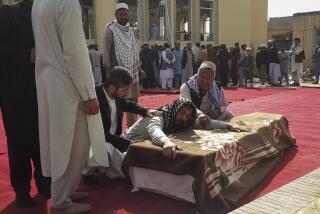Clinton, Top Pakistani Agree to Steps in Crisis
- Share via
WASHINGTON — President Clinton and Pakistani Prime Minister Nawaz Sharif sought Sunday to defuse a mounting military crisis along the border between India and Pakistan, calling for “concrete steps” to end a series of cross-border raids by Pakistani-backed guerrillas.
American officials said it was their understanding that in agreeing to a joint U.S.-Pakistani statement, Sharif promised immediate withdrawal of Pakistani-backed forces who have overrun several Indian military outposts in Kashmir over the past two months.
The two leaders huddled for almost three hours in Washington in a hastily arranged meeting at which the Pakistani leader appeared to concede that his country’s military had pushed the region to the brink of disaster.
Both India and Pakistan tested nuclear weapons in May, 1998, and Kashmir--the region at the center of their current dispute--is considered one of the world’s most militarily unstable.
In the statement issued after their meeting, Clinton and Sharif agreed that fighting in Kashmir--touched off by a series of Pakistani-backed incursions over the past two months--”is dangerous and contains the seeds of a wider conflict.”
According to the statement released late on a steamy Washington Fourth of July, Sharif agreed that “concrete steps will be taken” to restore the integrity of the Pakistani-Indian border in Kashmir, known as the Line of Control.
It remained unclear, however, how much control Sharif and Pakistan’s civilian leaders have over the troops who overran India’s border posts. Pakistani officials have consistently denied that their troops have crossed the disputed border. They claim that the insurgents inside India are local militants fighting Indian rule in Kashmir.
But Western diplomats say that Pakistani army officers have planned and directed the military action and that Pakistani soldiers are doing the bulk of the fighting. Western leaders, including Clinton, have backed India in the dispute and have explicitly called on Pakistan to withdraw.
A leading Islamic militant group today dissociated itself from Sharif’s statement and said it would not withdraw from the region.
“Pakistan may withdraw, but the [holy warriors] will not withdraw,” said Hafiz Mohammed Saeed, chief of the Lashkar-e-Taiban, a hard-line Sunni Muslim group.
Sharif’s agreement to Sunday’s statement appeared to reflect a growing willingness on Pakistan’s part to acknowledge its complicity in the cross-border thrusts. This apparent concession, however, might also have helped Sharif move a few paces closer to Pakistan’s long-standing goal: to draw the United States into the conflict over Kashmir as a mediator.
The Indian government has long rejected third-party intervention.
Clinton clearly resisted the role of arbiter Sunday. In their joint statement, Clinton and Sharif stressed that India and Pakistan must return to the direct negotiations over Kashmir that began in the Pakistani city of Lahore in February.
But Clinton’s expression of “personal interest” in those negotiations, as well as his willingness to meet with Sharif on a day’s notice and on a national holiday, seemed certain to buoy Pakistani officials, who believe Washington’s arbitration could be the key to negotiating a more favorable outcome to the decades-long dispute over Kashmir.
Clinton’s intervention also appeared to offer Pakistan some hope of holding off Indian retribution for the incursions, in which at least 300 Indians have died. In Sunday’s statement, Clinton “urged an immediate cessation of hostilities” once a withdrawal of troops from India has been completed.
Clinton’s intervention came at a particularly volatile moment for both sides in the conflict. The Indian government claimed a major military victory Sunday, saying its troops had retaken 16,000-foot Tiger Hill from the insurgents. India’s loss in early May of the strategic peak, which overlooks a highway that is India’s lone link to its northern territory, was a major blow.
The insurgents have used Tiger Hill to lob artillery fire down on the highway and surrounding areas for the past two months.
“This is a turning point,” said R. S. Jassal, an Indian government spokesman.
Indian officials declined to reveal the casualties absorbed by the forces who regained Tiger Hill. The soldiers scaled almost vertical cliffs, and by Sunday, nearly 40 Indian soldiers were thought to have died.
*
Healy reported from Washington and Filkins from New Delhi.
More to Read
Sign up for Essential California
The most important California stories and recommendations in your inbox every morning.
You may occasionally receive promotional content from the Los Angeles Times.














